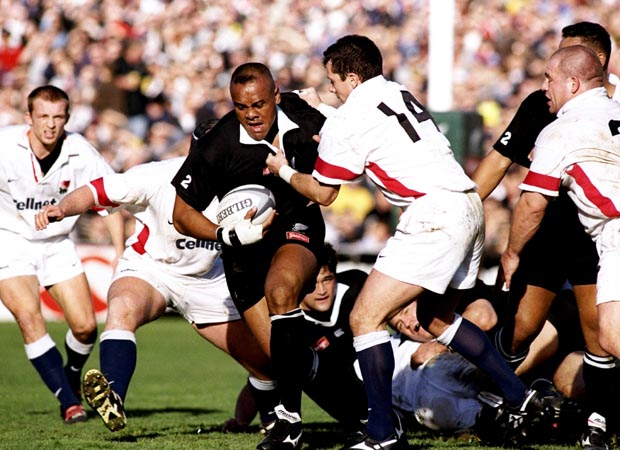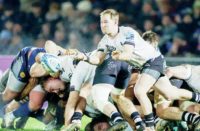 Isn't it strange how a perception of history over time can appear to alter what actually happened? Like all the fuss made about this summer's tour to New Zealand and the impact it could have on our developing England team and endless comparisons with the so called ‘Tour of Hell' in 1998.
Isn't it strange how a perception of history over time can appear to alter what actually happened? Like all the fuss made about this summer's tour to New Zealand and the impact it could have on our developing England team and endless comparisons with the so called ‘Tour of Hell' in 1998.
First, a little history lesson for those who say that the 1998 tour was “conceived by some madman at the RFU and seemingly designed to humiliate and destroy the fledgling England team”.
The reason the tour was organised was specifically at the request of the England team management and players.
Although England had regularly toured Australia during the late Eighties and early Nineties they hadn't toured New Zealand since 1985.
England faced New Zealand in both the 1991 and 1995 World Cups with a majority of players who had never played the All Blacks and so were under-prepared for the style of rugby they played, putting the England sides at a major disadvantage.
When I was in the squad we were fed a diet of All Black training videos and constantly told ‘see how the Blacks do this, see how they do that' which must have subconsciously made us slightly intimidated by this great side that we were trying to
We faced them for the first time since 1985 in the opening match of the 1991 World Cup and duly lost 18-12 knowing that if we faced them again we would win.
The 1995 semi-final match which introduced the talents of Jonah Lomu to the world and left Jason Leonard lying exhausted on the changing room floor where he famously said, “If we want to ever beat these b*****ds we have got to play them on a regular basis”.
The then IRB member for the RFU, John Jeavons-Fellows, was tasked with trying to arrange precisely that, regular fixtures against all the SANZAR countries and he worked tirelessly in an attempt to arrange something that had never existed before.
After much negotiation, a tour schedule was finally agreed with home and away matches each season against all the SANZAR nations from 1998, but in the meantime the game had turned professional in the summer of 1995.
That changed how the players were managed in that they were now employees of the clubs and needed their clubs' permission to tour.
In 1997, England acquired a new coach, Clive Woodward, who had not had much experience of coaching at a senior level in England with just a few years at London Irish and as coach of the England U21 side where I was manager.
I was a member of the Club England sub committee of the RFU (Woodward was also a member as England coach) in 1998 and we discussed the up-coming tour to Australia, New Zealand and South Africa, also the possible pitfalls that could occur given that a number established players had chosen not to tour.
Despite Club England chairman Fran Cotton expressing some reservations because of the number of big names left behind, Woodward was enthusiastic. In fact he said he thought that the young players were actually better than those staying at home and would give the opposition a big surprise.
This proved to be an over optimistic view of where the England team (including management) were in developmental terms at that time and they paid the price of selection mistakes.
These included blooding a young Jonny Wilkinson as fly-half in the first match against Australia, despite the fact that he had been playing inside centre for his club over the previous two seasons.
Despite the heavy losses that tour was probably the most important one that England have ever undertaken and changed the course of English rugby history.
Afterwards, the RFU and the England team management took a much more professional approach to the assessment and development of players, improved the selection process and, with the addition of some quality players, matured the squad into the side that won in 2003.
Since ‘98 the tour schedule has been streamlined, but England still face all the SANZAR nations home and away over a two- year cycle.
Partly due to the fact that all countries want games against England because of the revenue they produce (only games against England and the Lions are sell-outs in all the SANZAR countries), but also because beating England in rugby is still something that most other nations cherish above all.
It's also a fact that the international tour schedule is agreed years in advance, so that countries can make the logistical preparations that a visiting team and their supporters require. Those schedules may not be to everybody's liking but, contrary to popular belief, they have not been fixed but have changed over the years.
The summer window that we are just entering was placed at the second week in June at the start of the professional era, thereby ensuring that it didn't clash with the domestic season in the north, so tours would be over in plenty of time to allow the players an adequate break before the start of the next season, with the autumn window the same for the southern teams.
The addition of play-offs and finals at the end of the league season have stretched out the club season and bought it into conflict with international tours.
Instead of shrinking the windows for international rugby as suggested by Bath's Bruce Craig, the clubs could go back to the 22 game league without play-offs and finals – but there would be consequences.
First, a huge loss of revenue for the PRL and second, Saracens would be champions.



























